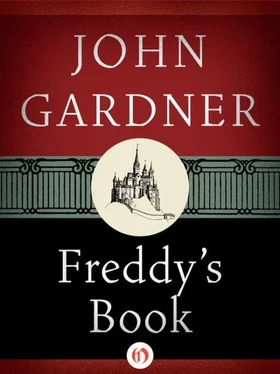It annoyed me, of course. No one likes his life’s work dismissed quite so lightly, not even a man who, like myself, holds all effort to be at least partly vanity, a heroic, death-defying labor of bees making honey that will rot in a season. To cover my annoyance — and perhaps nervousness (he did, of course, make one conscious of limitations) — I put my wine glass on the floor beside my foot, got my pipe and tobacco out, and began to load the bowl. I prudently stopped myself from asking if he’d mind if I smoked. “As I’m sure you know,” I said, soberly catching and holding his eye, “our work is no more fanciful than the next man’s, in the end. All history at least from the days of Thucydides is in a way ‘pseudo-history,’ as you call it — the tale of human struggle as it’s told by the side that won.”
“I know all that,” he snapped. (I had it coming, I’ll admit. I’d gone just a little sentimental there; downright self-righteous.) He got up to put another log on the fire. The cat came awake and shrank back, then fled at his approach. “All history as fiction,” he said, “psychological projection, ‘a distant mirror’—et cetera, et cetera.” As he was about to bend toward the log he paused and turned his whole torso to look at me, rolling his eyes to the corners like a horse. “It’s extremely useful stuff, you’ll tell me.” He waved toward the ceiling, bitterly ironic, and put on, again, his prissy look. “What’s heaven itself but pseudo-history? Yet we all die the happier for it, eh?”
“Some do,” I said cautiously, lighting my pipe.
He barked — literally barked like a dog — then bent down, picked up a log, carried it to the fire, and dumped it in. Sparks flew wildly. One fell on his trousers. He slapped at it. “I’m not against religion,” he said angrily, as if at the spark. “I’m not against fairytales either, for what they are. What I mind is historians that say anything they please. That’s what your discipline encourages, Winesap! Why do people choose it? Why is it the rage in every supposedly respectable university from Harvard to Berkeley? Baa. Because it’s easy, that’s why! No grubbing around in Latin or Old Slavonic, no sorting through dirty old books in the basements of libraries! Just hunt down sexual metaphors and allusions to ‘dusk’ in the papers of Thomas Jefferson! (You’ve read Garry Wills’ piece demolishing that, I hope.) So these eager intellectuals of the Now Generation come flooding to your courses — their courses, I mean; I don’t mean you personally, necessarily; you’ve done serious work from time to time. I mean those others, my busy little colleagues, the ones who were ‘Marxist revisionists’ five, ten years ago, and before that cracker-barrel Toynbees.” He stopped, panting a little; he’d lost his thread. Then abruptly, remembering, he raised his arm like a general, plunging on: “They flood into your courses, which helps the F.T.E., brings in money to the department; and they pour out their fairytale histories of ‘Blacks’ and ‘Chicanos’— baa —the history of people who have no history, which brings them federal grants, research assistants, free trips to the Bahamas to lie in the sun and write Freudian reconstructions of the Great White Sugar-dance!” He stood trembling, whistling like a bat.
My hand slightly shaking, I reached for the wine bottle and held it toward him. “Have more wine,” I said, and smiled. Angry as he made me, I had to give the old man an A for rhetoric.
He laughed, a kind of snort, eyes widening behind the thick, tinted lenses. “I admit it, Winesap, I’m not very civilized. I’m rigid and inflexible, and I’ve never learned to put the truth nicely.” He came a step nearer and held his glass out. I poured. When he’d swallowed a little, standing there in front of my chair like a student, his head only inches above the level of mine, he held out the glass again, this time pointing at my chin with it. “I’ll tell you the trouble with trying to learn history from fairytales,” he said, strong emotion in his voice. He came toward me a step, crowding me, still pointing. “They’re mindless — even the best of them! — all bullying, no intelligence, no moral profluence, ergo no real history! Static! They’re exactly true to life, those dreary flats between historical upheavals. The handsome prince comes; he finds his beloved and they live happily ever after; and no one any longer speaks or sends cards to the stepsisters.” He leered.
I nodded, reserving judgment, half inviting him to continue. Though he clung to his image, his argument had made a sudden, uncharacteristic skip of theme and logic — had leaped, arms and legs flailing, toward chaos. Perhaps we were about to get somewhere.
His voice became still more emotional, barely in control. “People like you, Professor Winesap,” he said, “may pity the stepsisters, the wicked old stepmother. You may try to understand them by some theory of dream-analysis. You may even work it out that the cruel old witch who’s behind it all is of use in the world, provoking those she injures toward greater benevolence.” He turned around jerkily, preparing to step to his chair again, but remained where he stood, bent forward, pointing back at me with his glass. “It never occurs to you that the beautiful princess and the wicked old witch believe exactly the same thing. Anything at all, including cunning and lies, will work for the beautiful; nothing helps the ugly.”
“That’s true,” I said lightly, “that never occurs to me.”
He baa ’d, then went to his chair and abruptly sat down. “Well, it’s a fact, Winesap. Take my word for it.”
I nodded, pushing my tongue into my cheek. I could see why they felt as they did about him, those people at the party — why Agaard, in his troubles, could turn only to a stranger.
He was saying, almost a shout, “I’ve had experience with the happy, blessed people of the palace, if you follow my metaphor.”
“The lucky ones.”
“Exactly.” He looked at me fiercely, as if I were the cruellest, most unfeeling of the lucky, then glanced away. Yellow flames leaped up around the log he’d put on, though I’d have sworn, a moment earlier, that the fire was dead.
He swallowed a little wine, then said, feeling he’d gone too far, no doubt, relaxing a little by an act of will, bringing his foot out from under his chair, “Well you can’t teach an old dog new tricks. I prefer the old-fashioned ideal of history. Hard-won facts, incontrovertible proofs.”
I nodded. The trouble with incontrovertible proofs I might have told him, is that they shut down conversation, inspire not mutual exploration through debate but scorn and attack. You prove that your man in his castle of logic and hard-won facts got some trivial detail wrong (I might mention the term psycho-history), and as his knights come fleeing in dismay to your side — blushing, stammering, hitting themselves for shame — you blast his elegant fortress to Kingdom Come.
“If history were done properly,” he said, “it would make us better men.”
I avoided his eyes.
“Men and women,” he said, clumsily correcting himself.
“We’re not in disagreement about that,” I said. I decided to let it rest there, a truce agreed upon by mutual misinterpretation. If he was trying to think of some new way to attack me, nothing came to him. It wouldn’t have mattered anyway, I thought. I no longer cared; his opinion was no longer of interest. Let him tyrannize his students, his son. It wasn’t my sport.
He stared for a long time, unmoving, into the fire, his eyebrows jammed inward, eyes darting here and there. He too could see that we’d come to an impasse, a classic stalemate; let him break it if he could. Then it seemed to me that I heard something move, somewhere above us. When I glanced at him I saw that Agaard had heard it too, though he was careful not to turn or look up. I continued to listen and heard it again, perhaps the sound of a chair being dragged across a floor upstairs. In embarrassment I drew back my foot, noticing that I’d been tromping rhythmically not on the claw of the table leg but Agaard’s shoe. He cleared his throat and glanced at me — we both looked down — then turned his toe inward, out of my way.
Читать дальше











